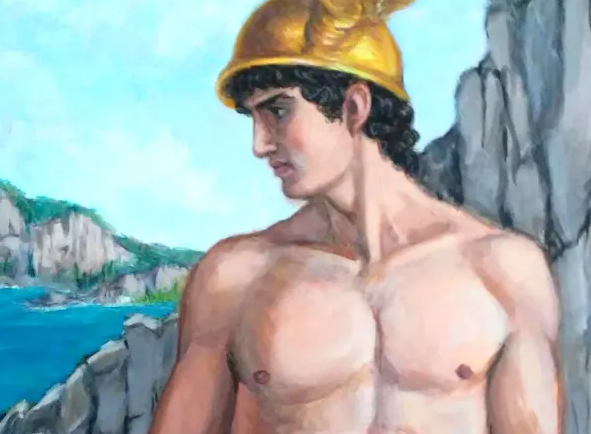
Wahya Circle
Thursday Thoughts
Comparative Practices 101
Hermes, a Trickster?
Since the day of His birth, or Creation, Hermes was considered a trickster. Such as the story of deception to steal Apollo's sacred cows, and then sacrificed two of them to the Gods. This fueled the association with crossing boundaries not only with others, but with His movements between the planes.
Sound like another Divine?
Let us begin with clarification. “Hermes” is a Greek God.
“Hermes Trismegistus” is the syncretic combination of the Greek God Hermes and the Egyptian God Thoth.
The figure of Hermes Trismegistus can also be found in both Islamic and Baháʼí writings. In those traditions Hermes Trismegistus has been associated with the prophet Idris. You can follow the story of this version through Hermeticism and the Occult Revival that occurred during the 13, 16, and 18 hundreds. “Magick” has risen several times, and will again. You walking this Journey with us will ensure this Knowledge passes forward.
All of that aside, we are going to focus on the Greek God Hermes here.
An Arcadian God who had a special love for the Peloponnese, the ancient Greeks believed Hermes was the son of Zeus and the nymph Maia (daughter of the Titan Atlas) and that He was born on Mt. Cyllene in Arcadia. As such, He was incorporated into their pantheon and subsequently the Roman. He has one of the longest, well documented, God histories and connections to date.
Around 1400 BCE, the Linear B tablets were being written. (Earlier Lessons) In these tablets, written by Mycenaean tribes, contain what mostly appear to be objects or possessions and commodities. Amongst these are the “stone heaps” of Hermes. Hermes (/ˈhɜːrmiːz/; Greek: Ἑρμῆς) became an Olympian deity in ancient Greek religion and mythology without hesitation. Hermes is considered the Herald of the Gods. He is also considered the Protector of Human Heralds, Travelers, Thieves, Merchants, Crators, Roads, Crossroads, Doorways, and Dreams. He is also considered a Conductor of the Dead, or one who ferries the souls between planes. Many Greeks would offer their “last libation” of the night to Hermes before sleep, for safe keeping of ‘sleep’ or ‘passage’, whichever came first. (Sounds apropos for NYE!) This God also sounds like the description of another “Filth Eater” (Hekate) we know.
LINGUISTIC LINEAGE
If we look a little closer at the linguistics of His name, we see Middle English derived from Old French hermite. This was the location of one of the Occult Revivals that took place and rooted tarot in modern history. We can also see it tracing to late Latin eremite and from Greek erēmitēs which derives from erēmos or ‘solitary’. (Many Practitioners see Hermes when the Hermit card in tarot arises in a spread or draw.)
We also understand in the division of origin stories, most scholars derive "Hermes" from Greek ἕρμα (herma). This lends more to the meaning of "stone heap." Busts on Hermes head would be found atop stone heaps, or cairn as well also know them, near crossroads. His head could often also be found in what we know now as middens, or trash heaps. Often though, as He is a Protector, placements were at crossroads and cemeteries as He is the one who helps souls cross planes.
As we move through time towards the Occult Revival of the 17th century, we see more of His tie with Thoth and as a founder of alchemy and astrology in His syncretic Trimegistus form.
Comparative Practices 101
Homage to Hermes
Hermes was honored in many cities in ancient Greece but especially in the Peloponnese at Mt. Cyllene and other city-states such as Megalopolis, Corinth and Argos. Athens had one of the oldest shrines to the God where the Hermaia Festival for young boys is held annually. Delos, Tanagra, and the Cyclades were other places where Hermes was especially popular.
Later as Romans assimilated Greeks into their culture, the festival began to be called Mercuralia. which took place in Maia. It became known also as the "Festival of Mercury". Mercury (Greek counterpart: Hermes) became celebrated as one of the Gods of Merchants and Commerce. Around the “Ides of Maia”, or May 15, merchants would sprinkle their heads, ships, merchandise, and their businesses with water taken from the well at Porta Capena and consecrated for blessing through aspersion (blessing with water).
Finally, the god had a noted sanctuary on Crete at Kato Symi where young men about to become full citizens, legally responsible for themselves, engaged in a two-month-long Rite where they would spend time cultivating their sexual identities and openness with others of the same or similar identity. Many of these bonds that formed were between older, wiser, men – also known as “hermits from the mountains” and younger men. Another Hermaia festival on Crete permitted slaves to temporarily take the role of their masters, in an experience of ‘freedom’. Once again, Hermes' association with crossing boundaries of all kinds is evident in many of these practices. Practitioners of all walks have gravitated to this deity for His true acceptance of all people, unconditionally. Because of His unconditional love and acceptance, Hermes is THE patron saint and Protector spirit found amongst Practitioners in many LGBTQ+ communities the world over.
To gain more knowledge, take some time with the short video below.
Thursday WD3
General - Journal - Book of Shadows
SUBMISSION: WD3 THU NS
STUDY!
EMAIL
Three Circles Medicine & Magick™
Please utilize the above email link
IF NO BUTTON IS PRESENT
to receive full Submission credit.




